Flower growers are akin to collectors, only they collect a collection not from objects, but from living plants and flowers. A worthy place in such a collection can be taken by a beautiful abutilon plant or indoor maple, so named because of the similarity of the leaves to maple.
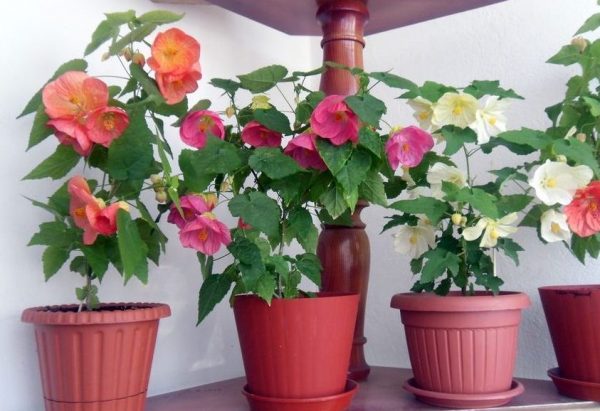
This is what abutilone looks like.
Along with its exquisite appearance, this crop from the malvaceae family has many more advantages, and one of them is simple care for abutilone (cablewort) at home.
Abutilone transplant after purchase
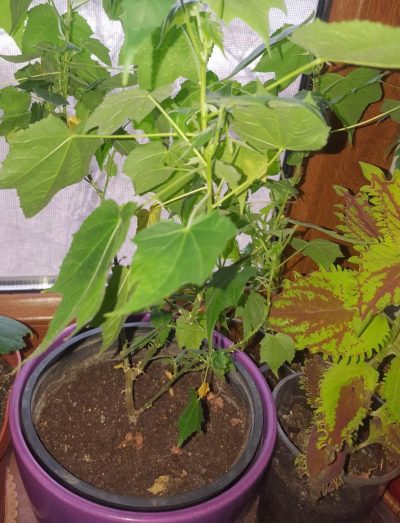
It's time to replant the flower in a larger pot.
Do not rush to replant the flower immediately after purchase. It must acclimatize to the new conditions within a week, then a transplant is necessary. This will allow you to evaluate the ratio of the sizes of the pot and the roots, as well as replace the soil with a more nutritious one.
Drainage is added to the bottom of the pot. The size of the container should be slightly larger than the volume of the roots. This is due to the fact that the flowering of indoor maple begins only after the roots fill the entire volume of the pot.
If the size of the original pot suits you, then you can get by with replacing the soil. You can prepare the soil mixture yourself by mixing:
- coarse sand or vermiculite – 1 part;
- peat - 1 part;
- turf soil - 2 parts.
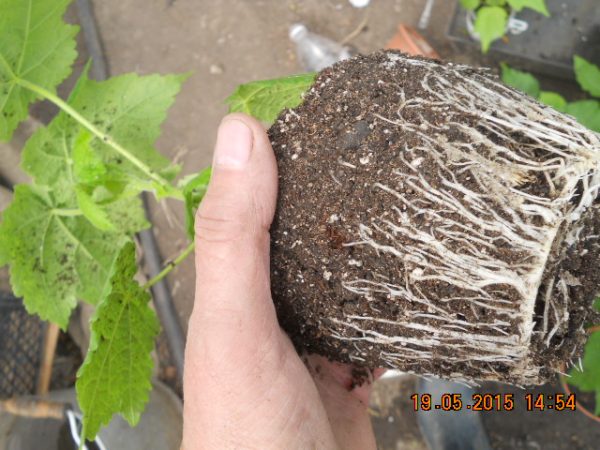
If you bought a flowering plant, you need to wait until the opened buds fall off, watering it as usual. Only after this can the abutilon be transplanted into a larger pot with loose, nutritious soil.
Caring for abutilone in an apartment
Despite the fact that the culture is native to the warm and humid climate of the subtropics and tropics, the indoor maple flower feels good at home. Abutilone does not require special care for growing on a windowsill.
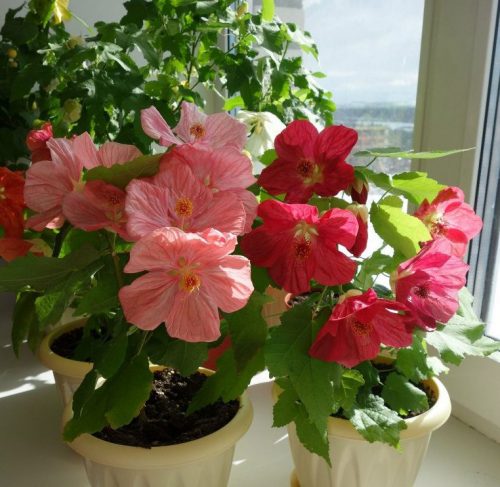
This is a real decoration for the apartment.
Compliance with temperature, lighting and nutrition regimes will provide comfortable conditions for flowering shrubs.House maple flowers often appear in photos as interior decoration.
Lighting
Lighting is an important factor in the development of any plant. For abutilone at home, diffused light on windows facing south is desirable, although direct sunlight for 2-3 hours is not excluded. In winter with short daylight hours, it is necessary to provide the ropeway with additional lighting. The north orientation of the windows is only suitable for maintenance in the summer.
Watering
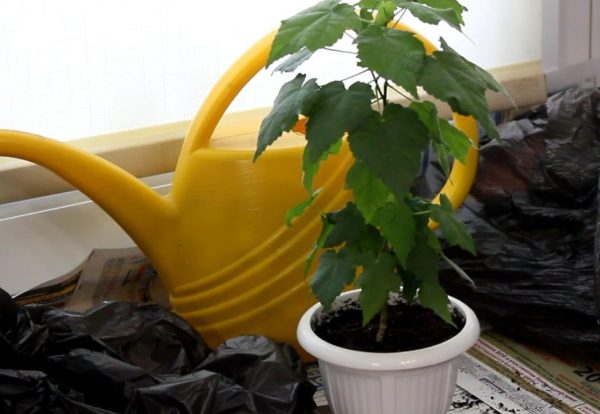
The photo shows indoor abutilon care at home.
Moisture consumption depends on the time of year. In summer, watering is abundant, 2 times a week, in winter – moderate, once every ten days. Abutilon is not picky about air humidity, but spraying will not harm it.
Top dressing
As a top dressing, you can buy universal fertilizer for flowering plants in the store. It is necessary to alternate mineral and organic fertilizers.
Nitrogen fertilizers are applied after spring pruning. This will allow foliage to grow. During the period of bud formation, phosphorus-potassium fertilizers are used to increase the number of buds. In winter, abutilon is fed once a month in case of flowering.
Important! When using purchased fertilizers, the dose should be halved compared to the instructions
Trimming
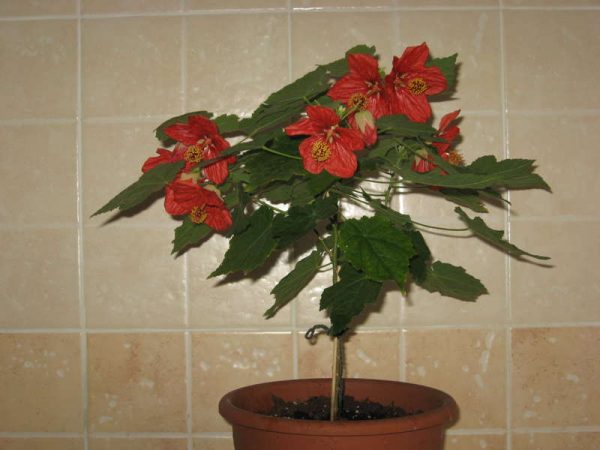
Indoor maple abutilon formed in the form of a small tree.
The plant quickly grows green mass, so it needs formative pruning.
In early spring, shoots are shortened by 1/3 of their length. Pruning will not only give the plant a beautiful shape, but will also provoke lush flowering. To form a mini-tree, as in the photo, remove all side shoots without damaging the main trunk.
In the fall, sanitary pruning is carried out.When abutilon fades, remove dry branches and faded buds, and adjust the shape of the crown for the winter.
Temperature
The optimal temperature in summer is from 18°C to 25°C. In winter, you need a cool temperature - +12°...+16 °C. Violation of the temperature regime leads to yellowing of the leaves and a decrease in flowering.
Transfer
The root system of abutilons grows as quickly as the above-ground part of the plant. The signal for replanting is the appearance of roots in the drainage holes and rapid drying of the soil.
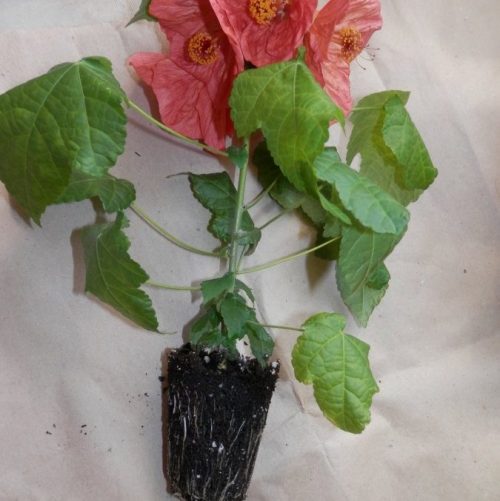
Transplantation using the transshipment method avoids injury to the roots.
For replanting, choose a pot slightly larger than the previous one. The procedure is carried out using the transshipment method, avoiding damage to the roots. The soil is needed with a slightly acidic reaction, nutritious, loose. Young bushes are replanted once a year, and adults - once every three years.
Growing abutilone from seeds
Some types of abutilone can be grow from seeds. Before sowing, the seeds should be pre-treated: washed, soaked in a stimulant, scarified.
Important! Purchased seeds do not need scarification.
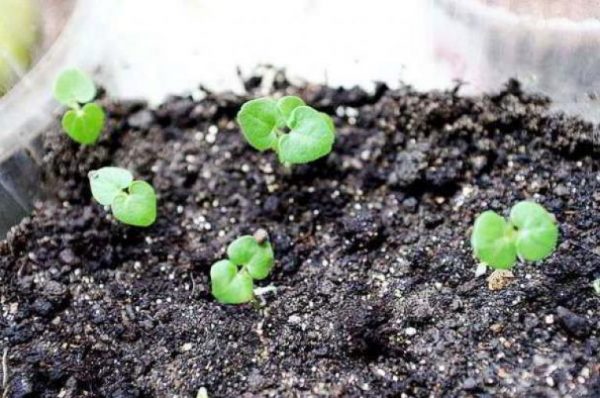
The first shoots appeared.
Technology for growing abutilone from store-bought seeds and caring for seedlings:
- For germination, you will need a transparent container with a lid, in which several holes are made for ventilation.
- The bottom of the container is lined with several layers of napkin or cotton pads and moistened with hot boiled water.
- Abutilon seeds are laid out on a warm, damp mat and covered with a lid.
- In 2-10 days the sprouts will hatch.
- Next, the sprouts are dropped into the humus-sand mixture. Before planting, the soil is moistened. The seedlings grow quickly and need to be replanted 2-3 times before flowering in the 4-5th month.
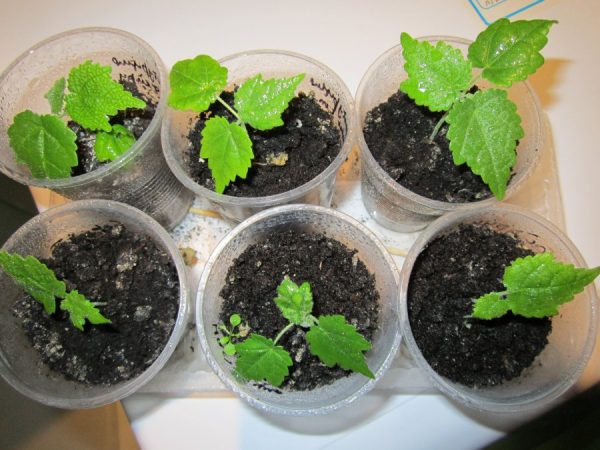
The photo shows already grown seedlings
In case of germinating your own seeds, scarification is necessary. To do this you will need fine sandpaper. The seeds just need to be lightly rubbed on the paper, breaking the integrity of the seed shell.
Propagation of abutilone by cuttings
At home, abutilone is easy propagated by cuttings, which are harvested in the spring when pruning. Such propagation allows preserving the varietal characteristics of the crop.
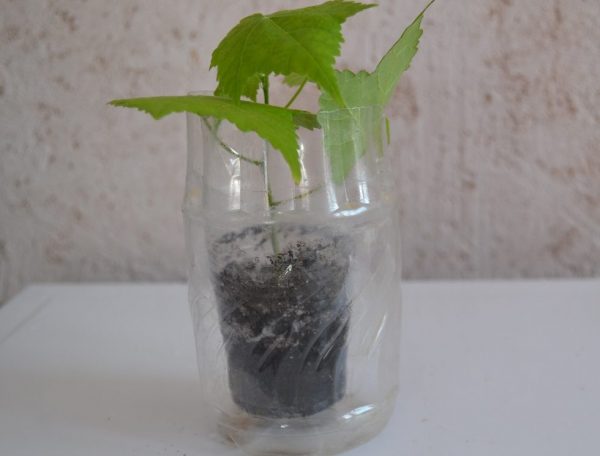
Rooting cuttings
The procedure is performed with a sterile instrument. The cuttings are cut 10-12 cm long. The lower part of the shoot is freed from leaves, treated with a root former and planted in nutritious soil. For rooting to be successful, it is advisable to cover the container with cuttings with a transparent lid or bag. The mini-greenhouse must be ventilated regularly.
Important! Variegated varieties are propagated only by cuttings.
Rooting will occur a few weeks after planting the cuttings. This will be evidenced by the buds starting to grow.
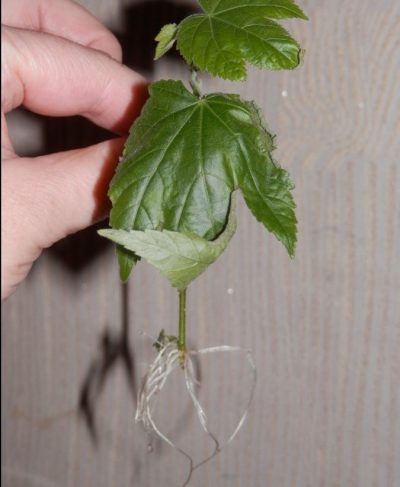
The photo shows a rooted cutting
Care for a young seedling in the same way as an adult plant. No less successful is the formation of the root system in water, followed by transplantation into loose, nutritious soil.
Keeping a flower outdoors in summer
During the summer season, abutilons can be planted in the garden. Before transplanting outdoors, the plant needs adaptation. In warm weather, the flower is taken out into the fresh air. First, for a few hours in partial shade, gradually increasing the time until the whole daylight hours. When the night temperature is not lower than 5°-7°C, the maple can be left outside overnight.
The planting site should be chosen protected from the midday sun. The plant should not be placed in an open place near the wall of a house or a solid fence.It is better to place the flower in a well-lit and ventilated place with afternoon partial shade, then it will be easier to care for abutilone.
Staying in the fresh air changes the appearance of abutilon: internodes are shortened, branching increases, shoots become more powerful, leaves become 2-3 times larger, petals are brighter in color.
The soil needs to be moisture-absorbing, nutritious and light. Loams can be diluted with coconut substrate, and sandy soils with peat, turf soil or clay. It is recommended to use organic fertilizers as fertilizers.
The top layer of soil is mulched with a layer of at least 5 cm. Mulch will protect the soil from overheating, prevent loosening and retain moisture, and protect the root system from recurrent frosts at the beginning of the season.
Indoor abutilon will not require special care even when kept in open ground.
Diseases, pests
Abutilone at home does not avoid attacks spider mite, scale insects, aphids, mealybugs. Some measures to repel pest attacks:
- Ticks love dry air. After treating the plant with an acaricide, you should increase the air humidity. This can be achieved by installing containers with water, spraying, and wetting the leaves with a damp cloth.
- Aphids are removed from the leaves with a soap solution, then rinsing them under running water.
- Mealybugs are removed from the plant with a cotton swab soaked in alcohol.
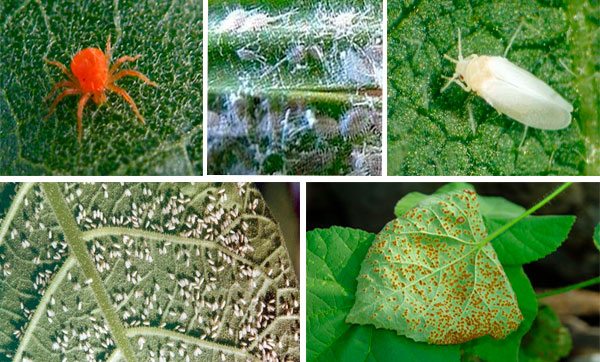
If not properly cared for, indoor maple trees can develop powdery mildew or root rot.
For powdery mildew the leaves become covered with a sticky coating, which can be removed by washing with a soapy solution, and the plant is also treated with Aktara.
Root rot is expressed in withering and falling of leaves.The roots affected by the disease are cut off and treated with crushed coal. To prevent diseases, use a solution of iron chelate.
Why do leaves turn yellow, curl, and fall off?
If you care for your home maple properly, then no problems should arise. Falling leaves and abutilone buds can be caused by low growing temperatures, drafts, or non-compliance with watering rules.
The tips of the leaves dry out and turn brown with low humidity and insufficient watering.
Leaves turning pale may be caused by low lighting. It is necessary to provide abutilone with sufficiently bright diffused light.
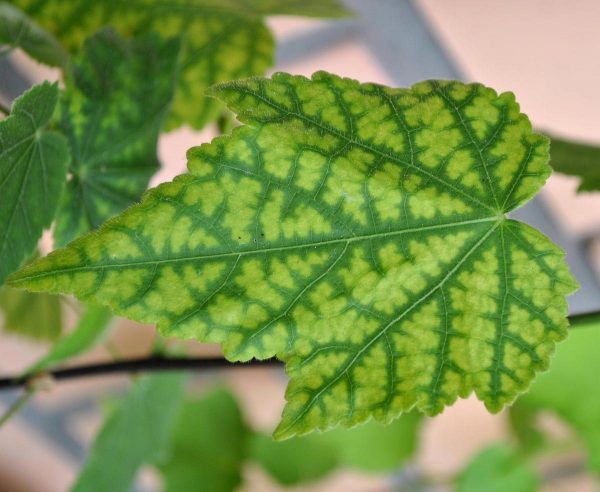
Chlorosis on leaves.
Lack of nutrients causes chlorosis in abutilon, expressed in yellowing of the leaves with preservation of green central veins as in the photo above. The following reasons are distinguished: yellowing of leaves:
- Iron deficiency – expressed in uniform yellowing between the veins of the leaf. The veins remain green. Then the color of the upper leaves becomes pale green or yellowish, sometimes whitish. Measures: Ferrovit or Fe+ according to instructions.
- Magnesium deficiency – expressed in yellowing of the edges of the leaf blades. Later, the edges of the leaf blade turn down, the leaf looks convex and curly. Measures: fertilize with magnesium sulfate according to instructions.
- Nitrogen deficiency - yellowing and lightening of color begins with the veins and the adjacent part of the leaf plate. Measures: nitrogen fertilizer for decorative deciduous plants.
Why does abutilone not bloom?
If the temperature and watering conditions are observed, the reasons for the lack of flowers on abutilon may be:
- Pot too big. Until the plant completely entangles the earthen ball with roots, it will not bloom.
- No formative pruning. To stimulate flowering, the tops of elongated shoots are pinched.
Which varieties of abutilone to choose for indoor growing
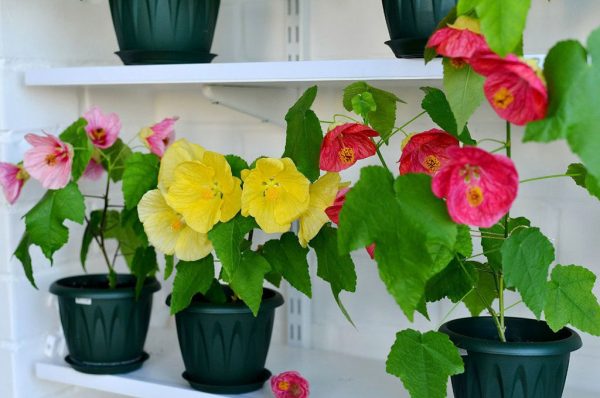
In the photo there is an abutilon flower
The photographs show that abutilon is characterized by carved leaves of various shapes, as well as drooping lantern inflorescences. Already in early spring, indoor maple is covered with bright flowers, which delight others with their appearance until late autumn, and sometimes all year round.
When choosing a variety of homemade maple for growing indoors, you must first decide on the parameters of the future purchase, which are very diverse:
- Height – 0.3…2.0 meters.
- Leaf color is green, spotted.
- The shape of the leaves is 3-5 lobed, heart-shaped, similar to grape or maple leaves.
- The color of the flowers is white, orange, crimson, yellow, red, pink, golden.
- The flower shape is simple, double.
- Duration of flowering - from spring to late autumn or year-round.
Thanks to the work of domestic and foreign breeders, the collections of amateur flower growers are replenished with new varieties of abutilone. Compact herbaceous and semi-shrub varieties, as well as hanging varieties, are more suitable for growing indoors.
The varieties and forms of Megapotamsky and hybrid types of abutilon meet these requirements.
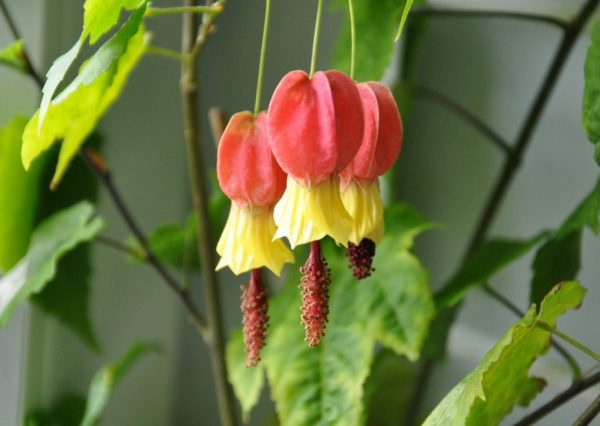
Megapotamian
Abutilon Megapotamensis has flowers that resemble a traditional Chinese lantern made of brightly colored rice paper. In favorable conditions it blooms constantly.
Hybrid abutilon is a low plant with flowers 4–5 cm in diameter. The range of colors of the petals is represented by white, all shades of yellow and red, sometimes with contrasting veins. The leaves are heart-shaped with teeth along the edges, less often the leaf shape is 3-5-lobed.
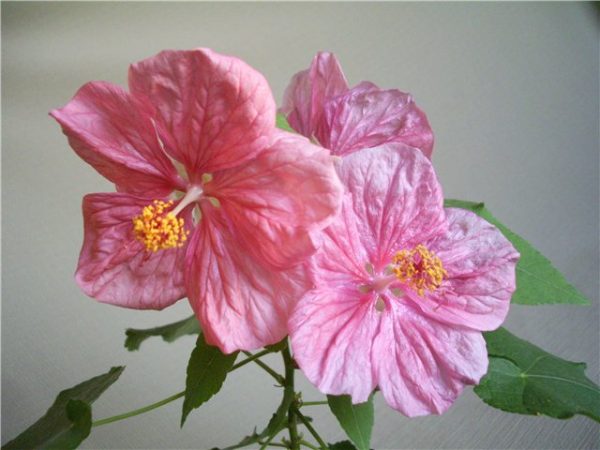
In the photo Bella mixed
Bella mixed series – consists of compact (about 40 cm high) plants with large (up to 8 cm in diameter) pastel-colored flowers that prefer light shade. Seed propagation is possible.Excellent for home keeping. Large, fully open saucer flowers cover the entire plant from early spring until late autumn. And even in winter, these abutilons can delight you with flowering. The photographs of flowers in this series speak for themselves.
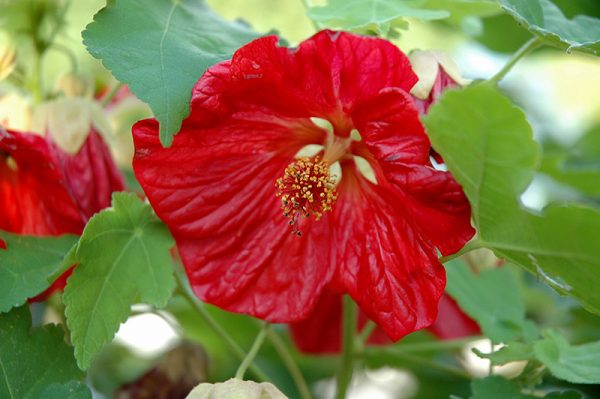
In the photo Large Flowered mixed
Hybrid series Large Flowered mixed – profusely flowering plants 50–80 cm high. Medium-sized flowers (4 cm) with a variety of shades, including crimson. The variety can be propagated by seeds.
Abutilone Darwin hybrids with velvety dark green leaves:
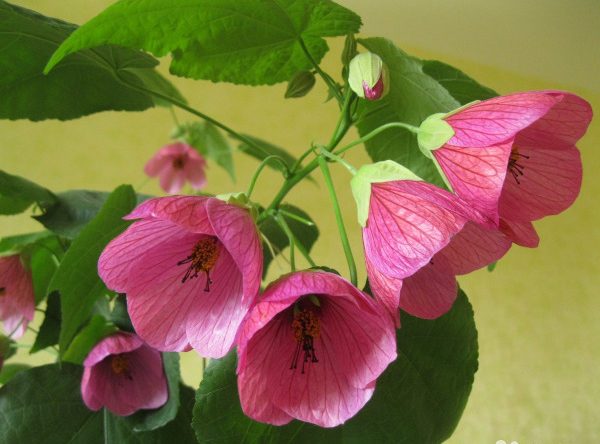
Eric Lilac
Eric Lilac – pale lilac flowers;
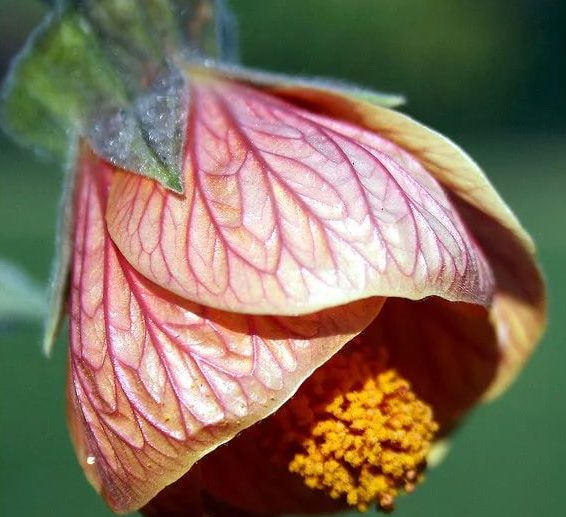
Eric Rose
Eric Roze – light pink flowers with dark pink veins;
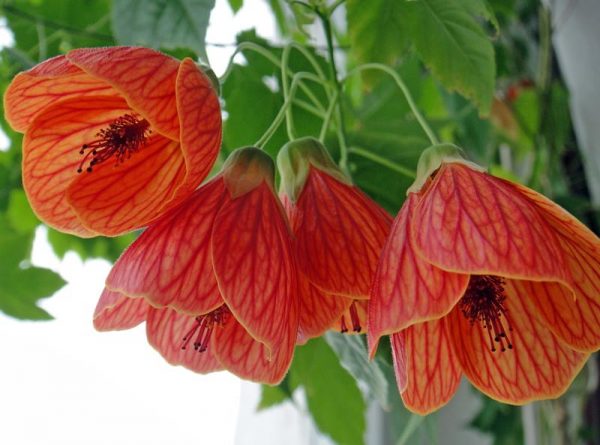
Laura
Laura – flowers are orange-yellow, with a border along the edge;
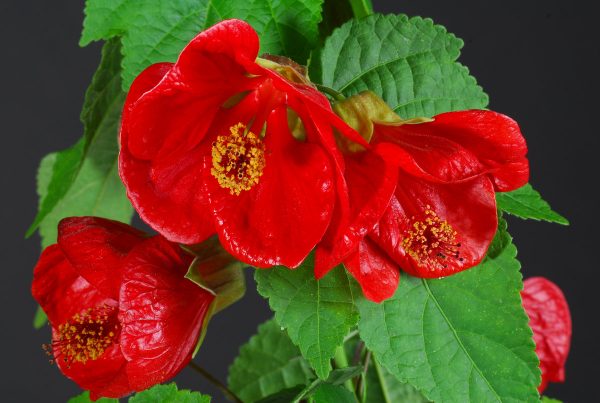
Red Princess
Red Princess – shiny red flowers;
Photos of cultivated species and varieties of abutilon (domestic maple) clearly reflect the beauty and diversity of plants.
Conclusion
Abutilon is a grateful flower. To successfully grow a flower in an apartment, it is enough to provide it with light, moisture, and a comfortable temperature. As a reward for your care, a cap of lantern flowers will appear above the pot, as in the pictures. Purchasing seeds of a mixture of indoor maple will allow you to obtain a composition of plants with a variety of flower colors.
Photo of abutilone
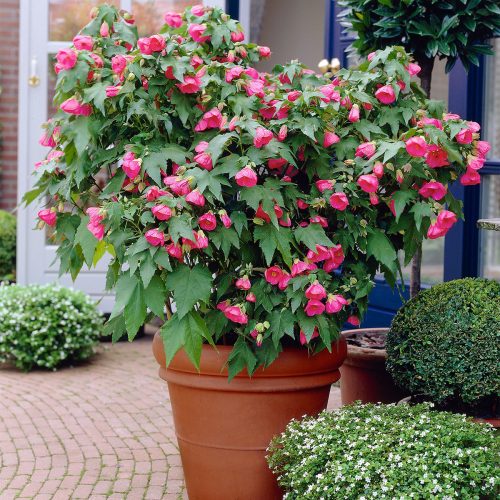
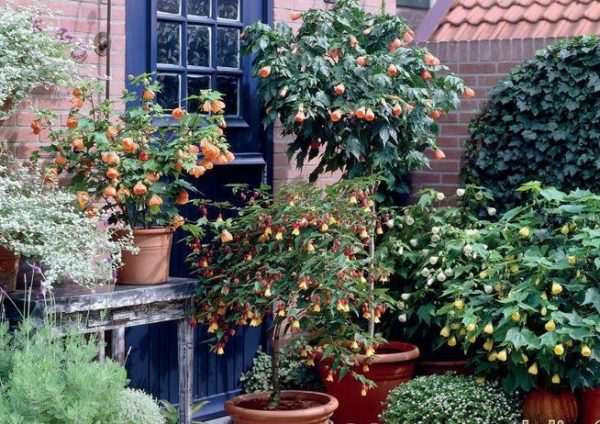
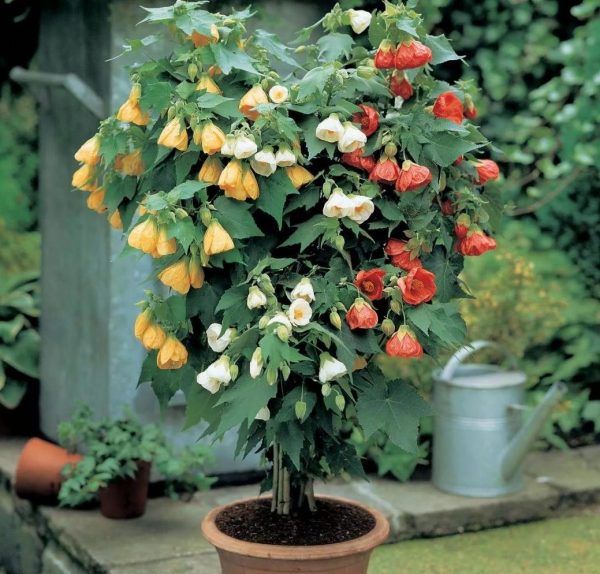
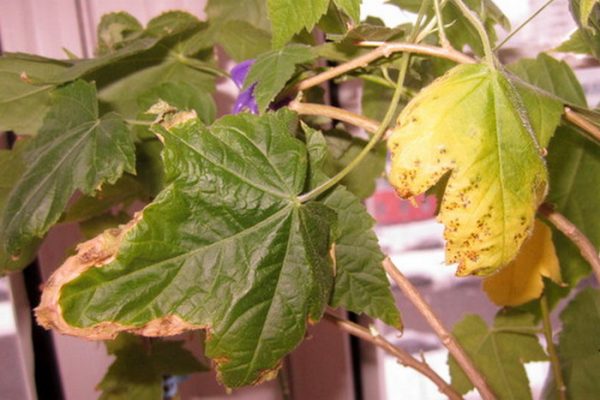
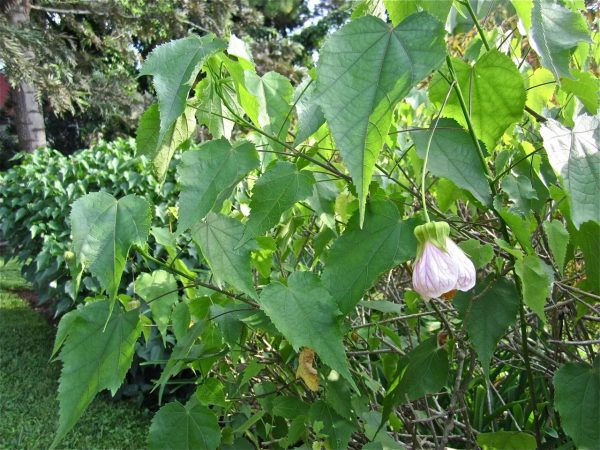

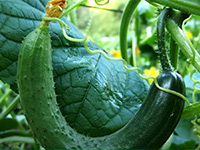 CUCUMBERS NEVER GET SICK, I'VE BEEN USING ONLY THIS FOR 40 YEARS! I SHARE A SECRET WITH YOU, CUCUMBERS ARE LIKE THE PICTURE!
CUCUMBERS NEVER GET SICK, I'VE BEEN USING ONLY THIS FOR 40 YEARS! I SHARE A SECRET WITH YOU, CUCUMBERS ARE LIKE THE PICTURE!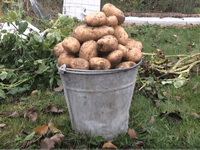 You can dig a bucket of potatoes from each bush. Do you think these are fairy tales? Watch the video
You can dig a bucket of potatoes from each bush. Do you think these are fairy tales? Watch the video
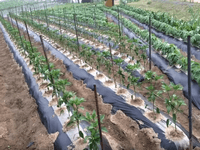 How our fellow gardeners work in Korea. There is a lot to learn and just fun to watch.
How our fellow gardeners work in Korea. There is a lot to learn and just fun to watch. Eye trainer. The author claims that with daily viewing, vision is restored. They don't charge money for views.
Eye trainer. The author claims that with daily viewing, vision is restored. They don't charge money for views.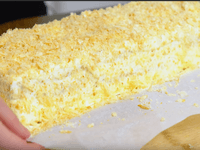 A 3-ingredient cake recipe in 30 minutes is better than Napoleon. Simple and very tasty.
A 3-ingredient cake recipe in 30 minutes is better than Napoleon. Simple and very tasty. Therapeutic exercises for cervical osteochondrosis. A complete set of exercises.
Therapeutic exercises for cervical osteochondrosis. A complete set of exercises. Which indoor plants match your zodiac sign?
Which indoor plants match your zodiac sign?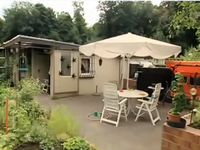 What about them? Excursion to German dachas.
What about them? Excursion to German dachas.
I have a lot of different flowers in my house, but abutilon doesn’t want to grow here. I bought it twice and after 3-4 months they start to turn yellow and dry out.
Svetlana, have you tried growing abutilon from seeds? There shouldn't be any difficulties there.
I wonder if in the south, in the Krasnodar region, abutilon can grow outside all year round?
I read somewhere that abutilons can withstand temperatures down to -8 degrees